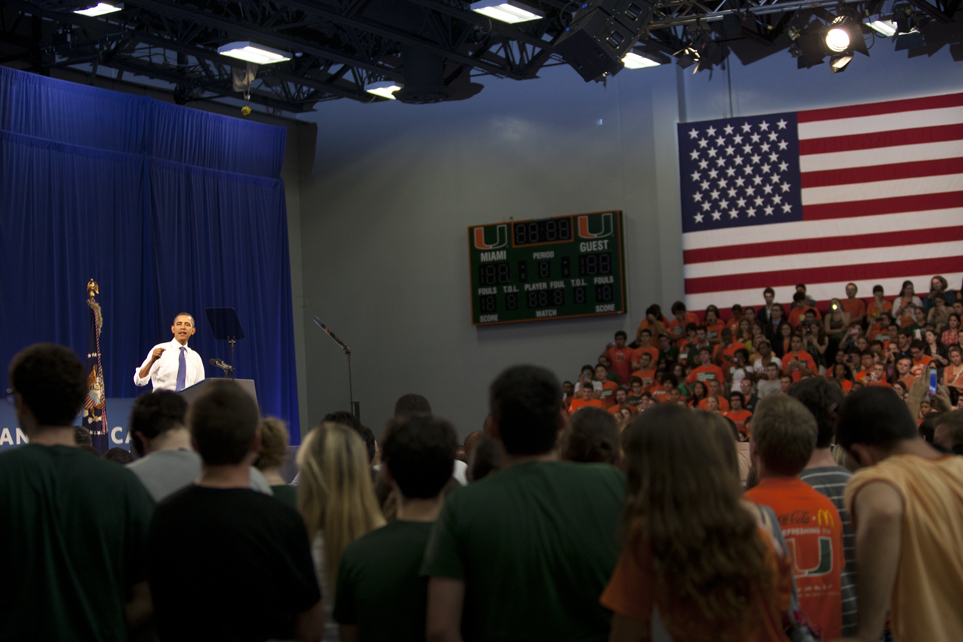

Throwing up the “U, United States President Barack Obama took the stage at around 2:30 p.m. Thursday at the University of Miami’s BankUnited Center Fieldhouse.
Obama’s visit to the Coral Gables campus was targeted at motivating the country to support the development of American-made energy in an effort to decrease dependence on foreign oil.
Several students who attended the event felt “inspired” by Obama’s remarks.
“This is exactly what we talk about at RSMAS,” said Ph.D. student Erica Towle, who is studying marine biology and fisheries at UM’s Rosenstiel School of Marine and Atmospheric Science. “He nailed exactly what America needs right now.”
Others were not as enthused.
“Say a few jokes, throw up the U, get people to like you by being personable, and push the re-election campaign,” said senior Anthony Gras. “Obama won his first campaign by being a good speaker despite his appearant lack of respect to our constitution, and I heard nothing to make me think differently today. I only heard ‘government is going to spend more and more money.'”
The decision to host the event in the Fieldhouse and to limit the attendees to students was made by the White House, which wanted to keep the event small. About 1,490 UM students and special guests – including UM President Donna E. Shalala, Senator Bill Nelson and Congresswoman Debbie Wasserman Schultz – attended Thursday’s event, according to Margot Winick, assistant vice president for UM Media Relations.
Before his speech Thursday, Obama toured the Industrial Assessment Center at the UM College of Engineering. The project, which has existed for 13 years, has given recommendations to more than 200 South Florida corporations about how to increase industrial energy efficiency.
James Tien, dean of the CoE, said that the Industrial Assessment Center could serve as an inspiration for Obama’s federal energy policy.
“We need more engineers, so I could not be prouder of those of you who are studying engineering,” Obama said at the beginning of his remarks Thursday. “It was fascinating stuff. I understood about 10 percent of what they told me, but it was impressive.”
Obama said that the work at the CoE couldn’t be more important.
“Figuring out how our buildings can waste less energy is one of the fastest, easiest ways to reduce our dependence on oil and save a lot of money in the process,” he said.
The president opened up his speech by noting the current problem in the United States: Gas prices are rising – again.
“And that hurts everyone – everyone who owns a car, everyone who owns a business,” Obama said. “It means you have to stretch your paycheck even further.”
Obama said that, especially because it is an election year, other politicians may begin to push an increase in drilling for oil.
Although the United States has independently produced more oil today than in the past eight years, the president said that “anyone who says we can drill ourselves out of this problem doesn’t know what they’re talking about or isn’t telling you the truth.”
Instead, he said, his administration is focused on the production of more home-grown energy.
“Young people especially understand this,” he said. “You guys are so much more aware than I was of conserving our natural resources and thinking about the planet.”
According to Obama, the United States consumes more than a fifth of the world’s oil, while the country itself only possesses 2 percent of the world’s oil reserves.
“And that means we can’t just rely on fossil fuels from the last century,” he said.
Obama said that, so far, there has been substantial progress made in promoting and developing clean energy, including the development of the first new nuclear power plant and the implementation of tougher fuel economy standards for cars and pickup trucks. And locally, in 2008, Miami was the first major American city to power its city hall entirely with solar and renewable energy.
But this progress is not a “silver bullet” to reducing dependence on foreign energy sources, Obama said.
For now, the president said, the federal government is working “to support discoveries that would get new energy ideas off the ground.”
“After all, it was public research dollars, over the course of 30 years, which helped develop the technologies that companies are now using to extract all this natural gas out of shale rock,” he said.
And America is capable of being optimistic and creative in making more progress in the development of alternative forms of energy, Obama said.
“Solving it will take time and effort,” Obama said at the end of his approximately 30-minute speech. “It will require our brightest scientists, our most creative companies, and most importantly, all of us – Democrats, Republicans and everyone in between – to do our part.”
Sophomore Vanessa Street said that until Obama reached out to youth specifically, she had never realized how large her carbon footprint must be.
“It was a smart move,” she said. “He is talking to our generation about something that matters to us. He’s being honest, blunt, and he was speaking in a way that reaches to us.”
Other students agreed.
“Hearing the president talk to you about how important it is made me take a step back,” sophomore Kiera Wallace said.
Before and after his speech, Obama interacted with students who attended the event, shaking hands, kissing cheeks and giving hugs.
“I got to shake his hand,” senior Coral Millican said. “He has really soft skin and I love that he looks you in the eye.”
Erica Hord, president of CoE’s advisory board, introduced Obama.
“You never really know what it’s like to meet the president until you do,” she said. “It’s exhilarating.”
Margaux Herrera, Alysha Khan, Stephanie Parra and Demi Rafuls contributed to this report.






